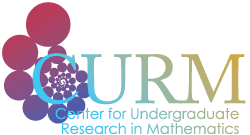CURM provides funding and training for participating faculty members to set up academic-year undergraduate research groups for early stage students at their own institution in collaboration with faculty and students at a partner institution. To be eligible for an award, the institutional partnership must be between a two-year or community college and a four-year institution. Ideally, the four-year institution will be one that students at the two-year institution will be likely to transfer into. If you would like to see a list of faculty who are looking for partners, here is a spreadsheet with submitted names. If you would like to put your name on the list, please complete this form.
Requirements of a funded research group:
- Partnership between a two- and four-year institution
- Research students in the first or second year of mathematical education to participate in an academic year research group
- Attendance at the Summer Faculty Workshop
- Collaborative research project between the two institutions in discrete math/graph theory, applied mathematics/modeling, data science, or math education
- Collaborative Give Back program where partnered research groups contribute to the larger mathematical community (e.g., present in a local elementary school, or organize a math fair, or tutor in an after school program)
- Student research presentations at a local or national math conference
- Final paper submitted to CURM
- Participation in program assessment
Award details:
- $7000 per research group for faculty workload adjustment to offer a credit-bearing research course at their institution (note that all costs related to instruction, including F&A, are limited to $7000)
- $1050 per research group for faculty and student travel (includes faculty transportation to summer workshop)
- $300 per research group in supplies
- Course credit for students
- In extremely rare cases, where a research course is demonstrated to be unfeasible at an institution, we may offer stipends to students instead of course credit
Application components (each partner should submit an application):
- Completed application form
- Short CV (2-3 pages)
- Letter of institutional support from your institution
- Recruitment plan that details how many students you intend to work with and how you plan to recruit a diverse group of students.
- Personal statement, describing current professional position and goals, institutional characteristics, and potential intellectual and cultural impacts of a CURM award. Explain how this research project might fit into your professional goals. The statement should also include which regional or national research meeting you and your students will attend, how your group will give back to the community, and your reasons for selecting the designated research area. You may also wish to include information about the timing of a CURM award – why is this an appropriate time for you to receive a minigrant?
- Partnership statement, describing any previous collaborative activities between you and your institutional partner, or, in the case of a new collaboration, any structures, frameworks, or processes you plan to engage with to ensure a productive collaboration. In particular, we want to know how your collaboration began, and how you see a CURM mini-grant strengthening this relationship. Be sure to discuss how a CURM award can help the transfer process from a 2-year to a 4-year institution for your potential research students.
